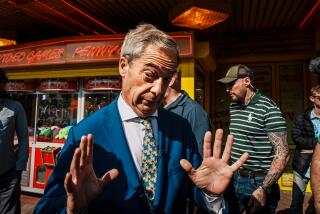Blair or Major, the Song Remains the Same
- Share via
LONDON — British election campaigns once were the lull before the lull, the issues-dominated domain of conservatives combating workers, and trade unions with grudges to settle. In this post-ideology year, amid imported-from-America glitz, there is a sea change: The 1997 search for new government has been an always articulate, sometimes zany spectacle long on style but short on substantive differences.
Unless pollsters, pundits and parties are colossally wrong, Labor Party insurgent Tony Blair will win Thursday’s election, ending 18 years of rule by former Prime Minister Margaret Thatcher and her Conservative heirs.
After a month of campaigning, the Labor margin over Prime Minister John Major’s Tories is counted in the high teens, about where it was before the hostilities began.
That was before Labor ran advertisements depicting Major and his treasury secretary as Laurel and Hardy, and it was before Conservative ads pictured a tiny Blair perched on German Chancellor Helmut Kohl’s lap--Tony as Europe’s puppet, get it?
Indeed, it is personalities that dominate this campaign, because, on the issues, there is little to differentiate the parties. Under Blair, Labor has swung from socialism to a free-market economy. The electoral fulcrum thus balances on which party can best make Britain’s welfare state work better. “Trust” is the theme of both campaigns.
Both are slow-paced by American standards--two or three tightly choreographed, television-friendly public appearances a day and endless electronic debates.
*
Street campaigning might be more voter-friendly except for the incidents of terrorism attributed to the Irish Republican Army. Candidate schedules are not published, and reporters accompanying them do not know where they are going until after they are on the bus.
Smiling Blair wages a winner’s campaign. He is careful to avoid mistakes, and is polished and quick on his feet. Asked at a rally what he as prime minister would do for British rock music, Blair responded: “I’d never play it.”
So much for Ugly Rumours, the name of Blair’s band in his college days.
Labor gaffes have been few, but one was to swap its traditional proletarian red in campaign advertising for imperial purple. Oops.
“You see a lot of purple used in black magic and wizardry. People will see it as a sinister image,” cautioned image consultant Mary Spillane. “They will think Labor has a hidden agenda, some secret plans, something hidden up its collective sleeve.” Exit purple.
The two party leaders sell the same product but hail from different sides of the street.
Major, leader of the political establishment, is a shopkeeper’s son who never went to college. Blair, representing what has always been a blue-collar party, is a lawyer who studied at Oxford. Blair reaches for middle-class votes. Major woos workers.
Are there shrimp sandwiches on Blair’s plane? Well Major, thank you, is happier with marmite, a gloppy brown extract of yeast that most Americans would dismiss as an early dropout in the search for peanut butter.
In a country where eccentricity is a national sport, chocolate lollipops are an apt symbol of a look-alike election race. The firm that makes them in the images of the candidates for prime minister says that more Major lollipops are selling.
But, notes commentator John Naughton, “tests reveal that all leaders taste exactly the same, just like real life.”
More to Read
Get the L.A. Times Politics newsletter
Deeply reported insights into legislation, politics and policy from Sacramento, Washington and beyond. In your inbox twice per week.
You may occasionally receive promotional content from the Los Angeles Times.








